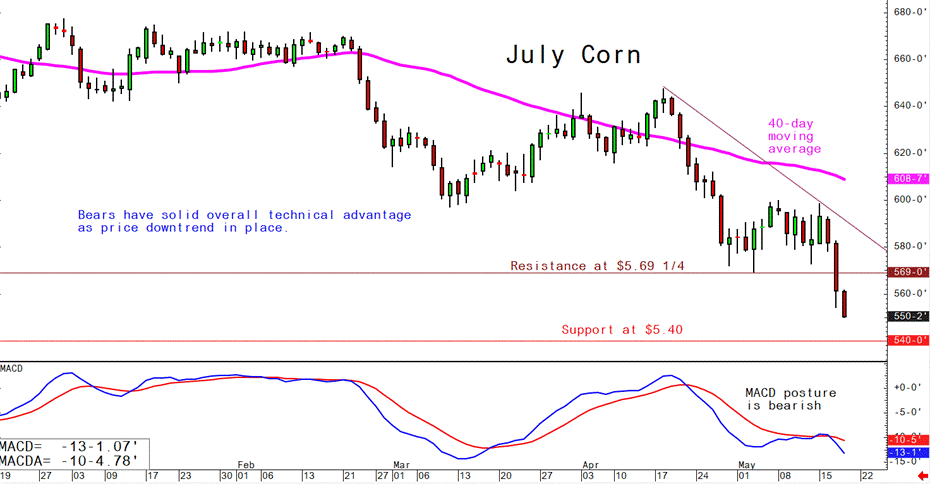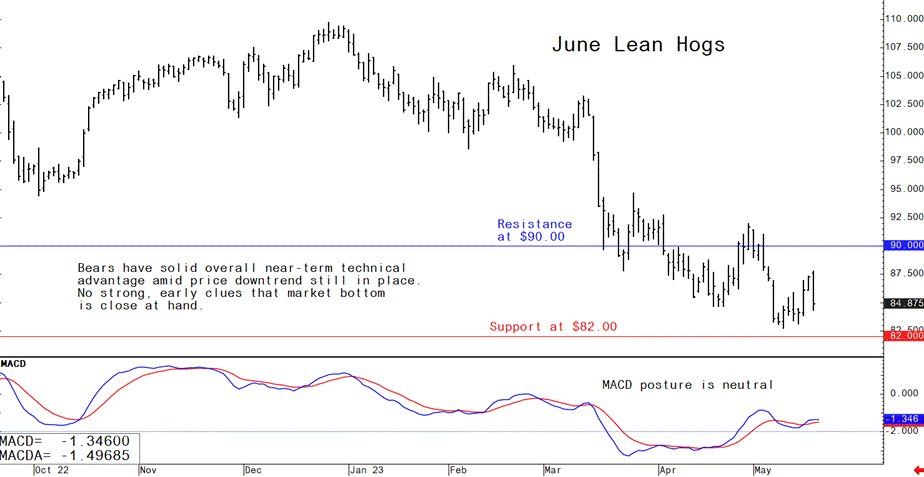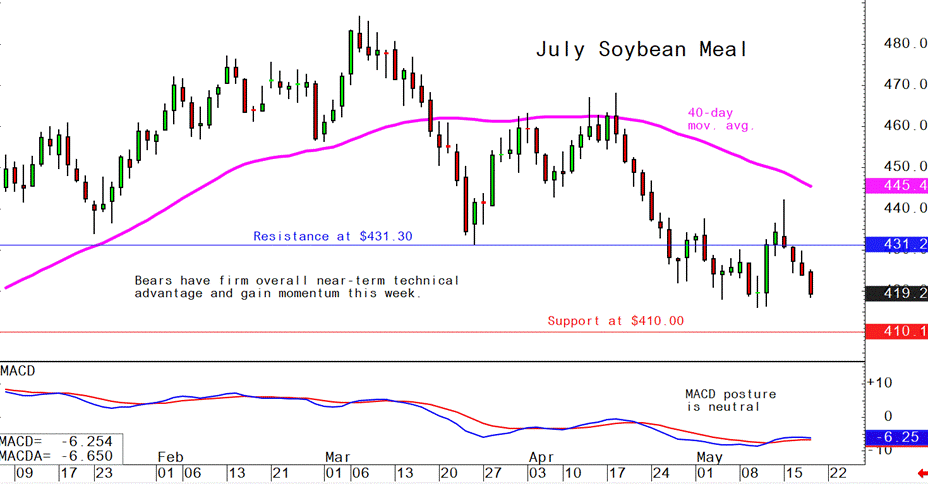



Pig outlook: Lean hog futures still mired in price downtrend
Market analyst Jim Wyckoff shares an update on the global pork industryJune lean hog futures continued to be trapped in a price downtrend on the daily bar chart and are not far above the recent contract low. The bears continue to possess the solid near-term technical advantage. Meantime, the latest CME lean hog index was up another 63 cents to $77.80 (as of May 16), extending its seasonal price climb. However, pork packers continue to struggle to find sustained US retailer buying. Traders are hesitant buyers in lean hog futures due to their premiums to the cash hog index. US grocers and consumers continue to favor beef over pork.
USDA US pork export sales
Pork: Net US sales of 31,900 MT for 2023 were up 6 percent from the previous week, but down 25 percent from the prior 4-week average. Increases were primarily for Mexico (15,500 MT, including decreases of 300 MT), China (5,200 MT, including decreases of 200 MT), Japan (2,700 MT, including decreases of 300 MT), Colombia (1,600 MT, including decreases of 100 MT), and Canada (1,000 MT, including decreases of 1,000 MT). Exports of 36,800 MT were unchanged from the previous week and from the prior 4-week average. The destinations were primarily to Mexico (15,400 MT), China (6,600 MT), Japan (4,100 MT), South Korea (3,100 MT), and Canada (2,100 MT).
NPPC outlines pork industry priorities in House Ag Subcommittee hearing
Scott Hays, President of the National Pork Producers Council (NPPC), told the House Ag Subcommittee on Livestock, Dairy, and Poultry struggles for hog farmers can be attributed to significantly moderated hog prices, record-high production costs that have increased by about 50% since 2020, trade retaliation, supply chain issues, labor shortages, threats from foreign animal diseases, and unfavorable legislation like California Proposition 12. He warned these challenges may lead to industry consolidation as many farmers might be forced to exit the industry.
Key policy priorities outlined by Hays for the 2023 Farm Bill include:
• Full funding for programs ensuring animal health, given the increasing threat of foreign animal diseases like African swine fever.
• Extension of Livestock Mandatory Price Reporting for one year while the industry gathers producer input for full reauthorization.
• Opposition to proposed changes under the Packers and Stockyards Act, with a call for meaningful reforms that provide greater transparency for pork producers.
• Increased funding for the Market Access Program and Foreign Market Development Program to build commercial export markets for U.S. ag products in the absence of meaningful trade access.
• Addressing labor shortage by improving the H-2A visa program to grant access to year-round agriculture industries.
California to work with pork industry on Prop 12 implementation
The California Department of Food and Agriculture (CDFA) pledged to work with the pork industry to implement Proposition 12, the initiative passed by the state's voters in 2018 which established minimum confinement standards for the sale of certain pork products within California borders. The U.S. Supreme Court last week upheld the law.
In a blog post, CDFA said, “As we approach July 1, when a previous court order suspending Prop 12 enforcement expires, CDFA looks forward to engaging with industry representatives to further discuss what is needed to achieve a smooth transition to compliance.”
Steve Lyle, the CDFA director of public affairs, said: “Enforcement with respect to pork products cannot occur prior to July 1 pursuant to a stipulation filed in the Cal Hispanic Chambers of Commerce case.” CDFA in the coming months said it will “continue to focus on engaging with stakeholders to inform and educate. Enforcement actions could be taken by the attorney general’s office or any county or city-level prosecutor in California.”
CDFA’s Animal Care Program will continue to focus on implementation of distributor registration requirements, accreditation of third-party certifiers, and outreach and technical assistance to businesses throughout the supply chain.
A specialist in animal law says the SCOTUS ruling to uphold California law will result in a patchwork of laws that are likely to make national meat producers very uncomfortable.
The next week’s likely high-low price trading ranges:
June lean hog futures--$82.00 to $90.00 and with a sideways bias
July soybean meal futures--$400.00 to $434.00, and with a sideways-lower bias
July corn futures--$5.35 to $5.70 and a sideways-lower bias
Latest analytical daily charts lean hog, soybean meal and corn futures










